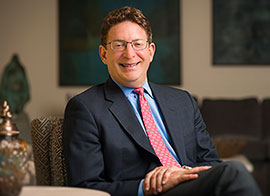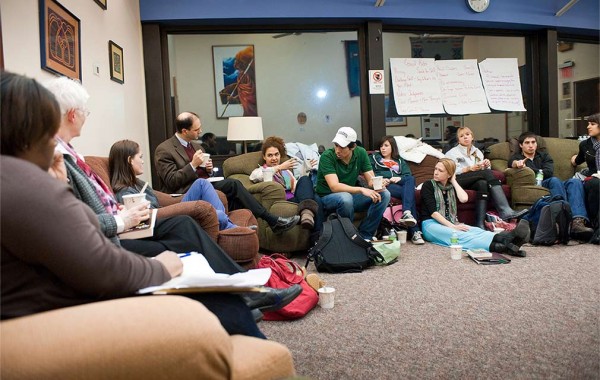
President Jeffrey Herbst (Photo by Andrew Daddio)
The national dialogue about sexual violence at American colleges and universities has intensified, and rightly so. One especially disturbing fact has been widely reported: nearly 20 percent of college-age women and about 6 percent of undergraduate men will be victims of attempted or actual sexual assault during their college years. Citing that national statistic, lawmakers and the White House have changed regulations and guidance that colleges operate under when adjudicating complaints of sexual assault. Questions have also been raised about the fairness of those proceedings to all parties involved.
As stewards of an institution whose mission is to educate students inside and outside the classroom, and also to maintain a healthy learning environment, we take this issue most seriously. We respect the needs and rights of all parties in a complaint and take great care to adjudicate each case promptly, fairly, and equitably. Therefore, we have adopted a multi-pronged approach: while we proactively update our policies according to federal legislation, U.S. Office of Civil rights guidelines, and national best practices, we also involve as many students as we can in training and educational programming.

Yes Means Yes, one of many initiatives at Colgate designed to educate students about healthy sexuality, has been in place since 2010. (Photo by Andrew Daddio)
During the first several weeks of the academic year, when national collegiate survey results indicate that first-year students in particular are most at risk, we expressed our commitment to ending sexual assault and violence on campus. Vice President and Dean of the College Suzy Nelson sent a series of letters home to parents, and I, along with Dean Nelson and Provost Douglas Hicks, sent a letter of concern calling on the entire campus community to report any incidents that occur so they can be addressed appropriately. As in past years, orientation included a mandatory training session on Colgate’s Equity Grievance Policy, procedures, and support for individuals who experience sexual assault and gender-based violence, including confidential resources and information on how to report to local law enforcement.
Dean of Students Scott Brown leads Colgate’s Sexual Climate Advisory Committee. This group is charged with developing and evaluating initiatives at the individual, community, and system level that contribute to a climate of sexual respect. This group of faculty, staff, and student members meets monthly to coordinate campus initiatives coming from all corners of the university. For example, an ongoing series of student-led Bystander Intervention Training sessions is designed to help students recognize how they can safely and appropriately intervene when they see behavior that causes concern. All student “Links” (mentors to new students) have received training, as have all residence hall community leaders. We have provided, and continue to provide, many opportunities for students to participate. Through other positive sexuality initiatives, such as the six-week seminar Yes Means Yes, we are empowering our young men and women to effect change both individually and in their community (you can read student participants’ perspectives in the feature article “Sex Talk: Beyond Yes and No”).
As you are no doubt aware, excessive drinking has been linked to unwanted sexual contact and assault. Our campus Alcohol and Other Drug Advisory Committee, also led by Dean Brown, oversees programs, policies, events, and educational initiatives. For example, the aforementioned bystander training initiative, which encourages students to do the right thing when someone needs help, lies at the intersection of these two issues. As well, in accordance with our medical amnesty and Good Samaritan exemption policies, those who come forward with a complaint about sexual violence will not be charged with an alcohol violation.
Also on the programming front, students have taken initiative as well; for example, hosting an open forum to frankly discuss the campus sexual climate, and producing and performing This is Not a Play About Sex. Written by Christina Liu ’13, the monologue-based play captures the dynamics and feelings that stem from an individual’s sexuality, gender identity, and forms of sexual expression.
Professor Lyn Rugg, associate provost for equity and diversity and Title IX coordinator, oversees our Equity Grievance Process, in which a trained panel of faculty and staff members hear cases that constitute a potential violation of our policy. That panel is also charged with determining responsibility, and issuing sanctions accordingly. Our process meets all recommendations and requirements in the national Campus SaVE Act and the 2013 reauthorization of the Violence Against Women Act. As the national conversation continues and more research emerges, we will continue to evolve our process and policy to incorporate best practices for addressing complaints of sexual assault, gender-based violence, and harassment.
Changing the sexual climate at Colgate can only happen with open dialogue — even when that dialogue is uncomfortable. My colleagues and I are committed to keeping the issue of sexual assault at the forefront of our daily work. This will be an ongoing educational process for everyone, myself included.






